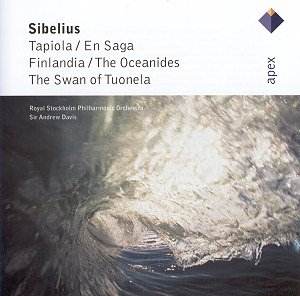 Composer: Jean Sibelius (1865-1957)
Composer: Jean Sibelius (1865-1957)
Works: Tapiola, En Saga, The Swan of Tuonela, Finlandia, The Oceanides
Performers: Royal Stockholm Philharmonic Orchestra, Sir Andrew Davis
Recording: February – March 1996, Stockholm Concert Hall
Label: Warner Classics’ Apex series
Sibelius’s tone poems occupy a pivotal space in the late Romantic repertoire, marrying the natural landscapes of Finland with a profound emotional depth that resonates through rich orchestral textures. This compilation presents five significant works that encapsulate his distinctive sound world, offering listeners a compelling journey through the mythic and the elemental. The pairing of these pieces, particularly through the lens of Sir Andrew Davis and the Royal Stockholm Philharmonic Orchestra, provides a potent reminder of Sibelius’s enduring legacy and the interpretative possibilities that continue to inspire performers and audiences alike.
The performances here are marked by a commendable orchestral cohesion, with Davis at the helm guiding his musicians through the nuanced landscapes of Sibelius’s scores. Particularly noteworthy is the brooding intensity that characterizes the climactic moments across these works, a hallmark of the Sibelius idiom. In “Tapiola,” for instance, the unfolding of the music is executed with a measured pace that allows the listener to fully absorb the dark, forested imagery the composer conjures. However, one might argue that the emotional depth could have been further amplified; moments of potential catharsis sometimes lack the gravitas one associates with the Finnish composer’s darker passages.
Interpretatively, the orchestra shines in its execution of texture and dynamics, though occasional imbalances arise in the solo passages. The cor anglais solo in “The Swan of Tuonela,” a pivotal moment in the work, feels somewhat recessed, missing the haunting quality that should evoke the mythological undercurrents of the tale. Similarly, the clarinet’s voice during the concluding phase of “En Saga” does not resonate with the clarity and individuality it requires, which diminishes the emotional impact of what should be a climactic resolution. These observations, while critical, must be contextualized within the greater achievement of the performances, which overall convey a thoughtful exploration of Sibelius’s intentions.
The engineering of the recording merits a discussion of its own. The sound is clear and well-focused, although the overall level is cut somewhat low, which may demand a boost from playback systems to achieve a satisfactory listening experience. This recording originally produced for Finlandia has found a new home in Warner’s Apex series, yet one cannot help but note the puzzling design choices in the accompanying booklet, which detracts from the overall presentation. Such details, while arguably secondary, can influence the listener’s experience and appreciation of the music.
In a competitive field of Sibelius recordings, Davis and the Royal Stockholm Philharmonic offer a solid interpretation that, while not without its shortcomings, provides a valuable addition to the discography. Comparisons with legendary versions, such as Beecham’s iconic 1958 recording of “The Oceanides,” reveal Davis’s limitations in capturing the intricate nuances and textural subtleties that Beecham so effortlessly achieved. Nonetheless, the sincerity and care with which Davis approaches these works affirm his standing as a true advocate for Sibelius’s music.
This compilation stands as a testament to the power of Sibelius’s orchestral language and the skill of those who interpret it. While certain interpretative choices may not fully realize the darker depths of the music, the overall performance remains a commendable endeavor that successfully engages with the spirit of Sibelius’s vision.



